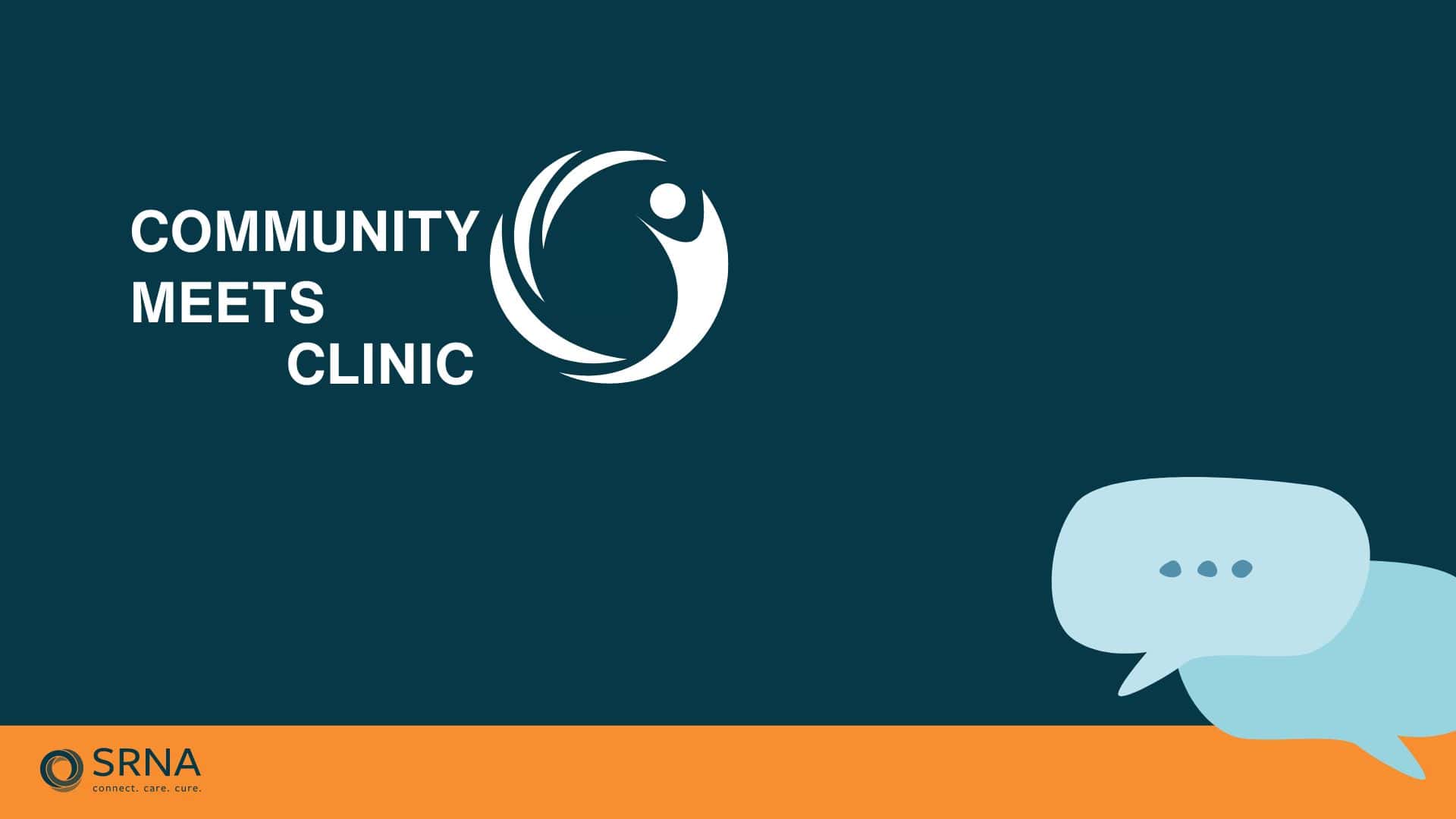Community Meets Clinic – Dr. Jennifer Graves
October 11, 2024
The “Community Meets Clinic” podcast series introduces clinicians and healthcare personnel specializing in rare neuroimmune disorders. In this episode, Krissy Dilger of SRNA was joined by Dr. Jennifer Graves from UC San Diego Health. Dr. Graves shared her journey into neurology and neuroimmunology [00:02:14]. She discussed the multidisciplinary approach of her clinic at UC San Diego Health, emphasizing the importance of holistic care for patients with rare neuroimmune diseases [00:08:45]. Dr. Graves highlighted the significance of learning from rare disorders and her hope for future advancements in treatment and cures [00:16:32]. The conversation concluded with insights on maintaining well-being as a clinician and her faith in the collaborative efforts of the medical community [00:24:09]. You can view the medical profile of Dr. Graves here.
Transcript
[00:00:02] Krissy Dilger: Welcome to the Community Meets Clinic series. A collaborative podcast to introduce the clinicians, clinician scientists, and health care personnel working directly with individuals and families facing a rare neuroimmune diagnosis. Hear directly from those in the clinic, and connect with the individuals whose focus is promoting quality of life for those diagnosed with a rare neuroimmune disorder.
[00:00:28] SRNA is a nonprofit focused on support, education, and research of rare neuroimmune disorders. You can learn more about us on our website at wearesrna.org. Community Meets Clinic is sponsored in part by Amgen, Alexion AstraZeneca Rare Disease, and UCB.
[00:00:50] My name is Krissy Dilger, and I moderated this episode. I was pleased to be joined by clinician Doctor Jennifer Graves from the University of San Diego Health. Doctor Graves is a professor of neurosciences and vice chair of human clinical research at UCSD. You can view her full bio in the podcast description. Welcome, Doctor Graves, and thank you so much for joining me today.
[00:01:16] Dr. Jennifer Graves: Thank you for having me.
[00:01:18] Krissy Dilger: So, I’m excited to be able to speak to you today and to learn a bit more about you as well as the clinic at the University of San Diego Health. To start, can you tell me a little bit about yourself and what led you to neurology and in particular, neuroimmunology?
[00:01:39] Dr. Jennifer Graves: Well, when I was 20 years old and planning to be a scientist, I was looking for something to dedicate my life to, and I came across a story of someone living with a neuroimmunologic disease. It happened to be multiple sclerosis, but that individual very much influenced me and my motivation for something to dedicate a career to.
[00:02:01] And around the same time, I learned about MD and PhD programs where you could learn to be a doctor, learn to identify the most important problems facing patients, but at the same time, learn how to do experiments and try to solve the problems of those diseases. So, I actually was inspired from the beginning to do neuroimmunology and pursued my medical training so that I could one day be able to run a neuroimmunology clinic.
[00:02:28] Dr. Jennifer Graves: Here in San Diego, we take care of people across the whole lifespan from children at our clinic at Rady Children’s Hospital to our veterans at the VA and to our main clinics at the University of California, San Diego. We take care of all forms of neuroimmunologic disease, and we take care of all aspects of living with those neuroimmunologic diseases.
[00:02:50] I’m both a neurologist with specialty training in neuroimmunology and a neuro-ophthalmologist. And as it turns out, the visual system tends to get hit by all of these rare neuroimmunologic diseases. So, we apply that expertise as well as all aspects of care for people living with these diseases.
[00:03:11] Krissy Dilger: Great, that’s a great specialty to kind of crossover into, as you mentioned, especially for the disorders that we advocate for. Which brings me to my next question. What led you to focus on the rare neuroimmune disorders? And do you have any particular interest areas that you are working on in research concerning these disorders?
[00:03:37] Dr. Jennifer Graves: Well, this is a group of individuals living with a disease that really needs to be championed, and although some of these disorders are rare, they teach us a lot about the physiology of the brain and the physiology of the immune system. So, even though some of these diseases affect smaller numbers of individuals, they actually inform the whole field, and they inform our knowledge and impact our understanding of health.
[00:04:04] So, I think that these rare diseases are incredibly important for the people living with them, but they’re also incredibly important for us as doctors and researchers to understand because our knowledge in one condition does cross over to other conditions and to supporting health in general for individuals. So, I think they’re a really important group of disorders, and they certainly can impact the entirety of a patient’s life and deserve our full research and attention.
[00:04:36] Krissy Dilger: Can you share more about your specific neuroimmunology multidisciplinary clinic team? What other specialists might a new patient expect to see if they have an appointment at San Diego Health, and how does a new patient typically get connected with you? What might that whole process look like?
[00:04:57] Dr. Jennifer Graves: So, excellent question. So, we obviously have neurologists as being the central part of the provision of care, but we partner with lots of different other types of specialists. So, we have nursing support, and there’s very specific roles for some of our nursing care providers in our different settings both in the pediatric and the adult settings.
[00:05:20] We also partner with neuropsychologists in both the pediatric and adult settings as many of these disorders can affect cognition. So, we collaborate with experts for both people in stages of development and childhood as well as people who are in young adulthood, middle adulthood, and aging with some of these disorders.
[00:05:40] Dr. Jennifer Graves: We partner with rehabilitation experts, physical therapists, occupational therapists, and speech therapists, and in the realm of vision, occasionally we will specifically work on visual rehabilitation, or for people who have lost a significant proportion of their sight we will work with low vision disorder clinics as well.
[00:05:53] We’re also supported by social workers because it’s not just the medical that one has to think about living with these diseases. It’s how the full life looks living with these diseases. So we have social work support to help people move forward and live their lives with these conditions.
[00:06:20] Krissy Dilger: Great, thank you so much. And I guess just wanted to touch on the, are you accepting new patients? How might someone, I guess, get a hold of your clinic to make an appointment or get a consultation?
[00:06:34] Dr. Jennifer Graves: We are absolutely accepting new patients at all of our locations and settings from Rady Children’s to the VA to the UC San Diego primary clinics. Most of our information and contact numbers are available online. And if anyone is having any difficulty getting through, please let us know even if it means directly finding me somehow, because we want to be taking care of the people in our communities.
[00:07:00] We accept people in our catchment area here in Southern California, but we also take referrals from all around the country as well as all around the world.
[00:07:11] Krissy Dilger: Great, thank you. I guess moving into a little bit more personal side of things, I can imagine as a clinician, especially when you’re dealing with so much unknown with these disorders, that it just can be incredibly difficult. How do you take care of yourself in the meantime? How do you stay grounded? How do you reenergize so that you don’t lose yourself in the emotions that can kind of come along with caring for these patients with these diagnoses?
[00:07:46] Dr. Jennifer Graves: Well, first, I really appreciate that question. I think it’s very important as a care provider to make sure that you’re maintaining your drive and taking care of patients. The first thought I have is that usually, it’s my time with patients that helps build up my energy to do research and to take on these diseases that it’s my time with my patients that inspires me the most.
[00:08:10] So, I will say that my patients are my number one source of inspiration, and they help me with the budgets and the paperwork and the administrative things that can sometimes burden care providers in our modern environment. But it’s energizing for me to be with patients, to meet them in the moment of their diagnosis or meet them in the moment of their need. That is something that greatly motivates me.
[00:08:33] The second response is I think just as we tell our patients to take a look at their whole life, their whole lifestyle in terms of diet, exercise, rest, mental wellness, that it’s important that we take our own recommendations. I believe very strongly for myself, my team, and my patients that physical activity, time outside, trying to eat healthy, trying to sleep, and taking care of oneself are very important.
[00:08:59] I think the most important of those is physical activity and moving the body through space is a very important part of overall wellness, and I look for opportunities to do that whether it’s hiking or exercising or swimming. I think it’s very important for me and my patients and my team.
[00:09:19] Krissy Dilger: These are all great sentiments and great ways to take care. I know that we can all use those general wellness things to keep us going throughout the day, and I love that. So, anything that you would like to share with people with these disorders or families who are considering your clinic for care?
[00:09:44] Dr. Jennifer Graves: Well, I think that the most important thing is we are very committed to people. We’ve all made decisions to dedicate our lives and careers to these disorders. We’re very passionate about it. We love what we do, and we’re really here to take care of people and to try to put an end to these disorders.
[00:10:02] So, we are here to take care of the whole patient, all aspects of living with the disease, and we’re here to research so that we can put ourselves out of business and try to cure these diseases for everyone living with them.
[00:10:18] Krissy Dilger: That’s great and your clinic was recently recognized as a center of excellence in rare neuroimmune disorders. So, just congratulations, and we at SRNA are grateful for clinics and physicians like yourself who specialize in these disorders and really are dedicated to the people who need you most and to the people with these disorders. And we’re hopeful for the future. So, that leads me to my next question. What are you hopeful for in the future for neuroimmune disorders?
[00:10:53] Dr. Jennifer Graves: Well, something that gives me hope is the current momentum we have on the scientific side. When I first started medical school, the majority of these disorders had no treatment, and some of these disorders hadn’t even been identified or named. So, just in the course of my career, I have seen a blossoming of treatments that have high efficacy against these disorders.
[00:11:15] I’ve seen some of the disorders be named, whether it’s some of the autoimmune encephalitis or anti-MOG antibody disorder or even the definition of neuromyelitis optica has all occurred in my career span. And that gives me a lot of hope about the momentum and the speed with which our field is moving forward and gives me hope that in my and your lifespan, we will get close to the end and a cure for these disorders.
[00:11:44] Dr. Jennifer Graves: So, it makes me very motivated to have seen that evolve over my lifespan. I have a lot of faith in our community, our patients, our providers, and our researchers that working together we will make a huge difference for people living with these diseases.
[00:12:00] Krissy Dilger: Well, thank you so much for joining me today. I loved getting to know you a little bit better and learning about the clinic. I know our listeners will too. So, I just want to thank you again and hopefully, we’ll hear you again on maybe another one of our podcasts.
[00:12:17] Dr. Jennifer Graves: Well, thank you so much for inviting me.
[00:12:23] Krissy Dilger: Thank you to our Community Meets Clinic sponsors, Amgen, Alexion AstraZeneca Rare Disease, and UCB. Amgen is focused on the discovery, development, and commercialization of medicines that address critical needs for people impacted by rare, autoimmune, and severe inflammatory diseases. They apply scientific expertise and courage to bring clinically meaningful therapies to patients. Amgen believes science and compassion must work together to transform lives.
[00:12:54] Alexion AstraZeneca Rare Disease is a global biopharmaceutical company focused on serving patients with severe and rare disorders through the innovation, development, and commercialization of life-transforming therapeutic products. Their goal is to deliver medical breakthroughs where none currently exist, and they are committed to ensuring that patient perspective and community engagement are always at the forefront of their work.
[00:13:21] UCB innovates and delivers solutions that make real improvements for people living with severe diseases. They partner with and listen to patients, caregivers, and stakeholders across the healthcare system to identify promising innovations that create valuable health solutions.
LISTEN & SUBSCRIBE
TO PODCAST
DOWNLOAD MP3
DOWNLOAD TRANSCRIPT












